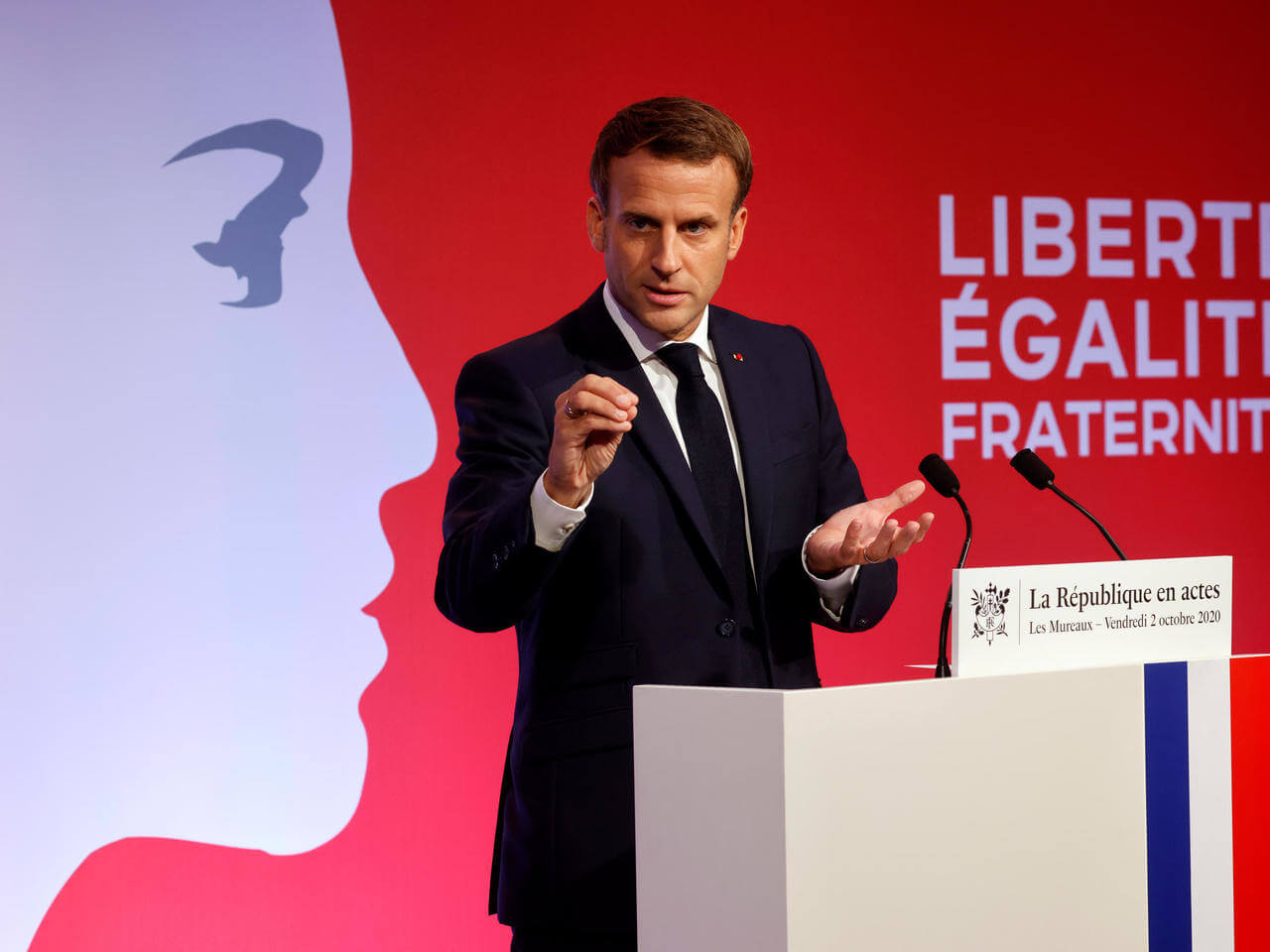On Wednesday, French President Emmanuel Macron’s government presented a draft law to crack down on “religious separatism” in the country. This comes in furtherance of Macron’s speech on 2 October, wherein he vowed to pursue significant changes in French laws to combat growing radicalism amongst French Muslims.
Macron believes Islam is “a religion in crisis”. His announcement follows the death of Samuel Paty, a 47-year old secondary school teacher, who was beheaded in Conflans Saint-Honorine. The assailant was identified as an 18-year-old Chechen refugee. The attack was in response to a classroom discussion conducted by Paty in which he displayed cartoons of Prophet Muhammad, which was considered offensive by several Muslim students and their parents. Consequently, cities across France, including Paris, Lyon, Marseille, and Bordeaux, witnessed large-scale demonstrations. Protestors came out in support of the deceased teacher. Simultaneously, an anti-terror investigation has been initiated by French authorities into Paty’s death.
While Macron expressed his intention to introduce strict laws against religious radicalism, this is the first time the exact content of the document has been released. However, there is no direct mention of Islam or Muslims in the text. The law was presented under the carefully worded title: “Supporting Republican Principle.”
The draft law aims to introduce a wide range of mechanisms to combat religious radicalism in the country. The proposal encourages religious institutions to officially declare themselves as places of worship. This is believed to help government authorities identify and regulate the institutions. Moreover, while the law does not explicitly forbid foreign funding, it mandates institutions to declare any donations larger than € 10,000. The law also grants local authorities the power to shut down religious institutions “in which the remarks that are made, the ideas or theories that are disseminated or the activities that take place: cause discrimination, hatred or violence.”
Apart from regulating religious institutions and its funding, the law also looks to change social practices that are primarily prevalent in France’s Muslim community. For example, in order to bring an end to “clandestine” educational institutions that are known to spread religious extremism, the law makes it mandatory for children to enrol in schools from age three. According to Macron, “Schools must first and foremost instil the values of the Republic and not those of a religion, and educate citizens, not worshippers.” France’s education minister, Jean-Michel Blanquer, also said that a “homeschooling authorisation system” would be set up to assess exceptional cases in which homeschooling will be permitted “in accordance with the rights of the child.”
Additionally, the new law intends to bring an end to forced marriages by introducing compulsory interviews with public officials, who can forbid the marriage if there is any indication of coercion. It criminalises the provision of “virginity certificates” for women and allows state officials to revoke residency permits of individuals participating in the practice of polygamy.
Furthermore, the draft law takes up the herculean task of bringing an end to hate speech on digital platforms. Consequently, it imposes a fine of up to € 45,000 and a prison sentence of three years for the act of “disseminating information about someone’s private, family or professional life that makes them identifiable with the aim of endangering their lives.”
Defending the proposal at a press conference on Wednesday, Prime Minister Jean Castex said that the laws are a means for the Republic to “defend itself.” He reiterated that the law does not intend to target or victimise any particular religion, but merely focuses on protecting the fundamental values of the French Republic, including the freedom of religion.
However, human rights groups, including Amnesty International, and several Muslim organisations in France, such as the Rassemblement des Musulmans de France, claim that the law will lead to further stigmatisation of an already vulnerable community. While the law does not explicitly target Muslims or Islam, the events leading up to the law make it clear that it aims to specifically crack down on growing radicalism and separatism amongst the Muslim community in France. Two weeks ago, France’s Interior Minister, Gerald Darmanin, initiated an investigation into 76 mosques the government suspected of encouraging “separatism” and “extremism.” He said that following the investigation all Mosques found to be “breeding grounds of terrorism” would immediately be shut down.
France Presents New Anti-Separatism Law
French President Emmanuel Macron secured the support of his cabinet for a new law that aims to introduce a wide range of mechanisms to combat religious radicalism in the country.
December 10, 2020

French President Emmanuel Macron presenting his proposal to combat "Islamic Separatism" during his speech in Paris on October 2. SOURCE: REUTERS
